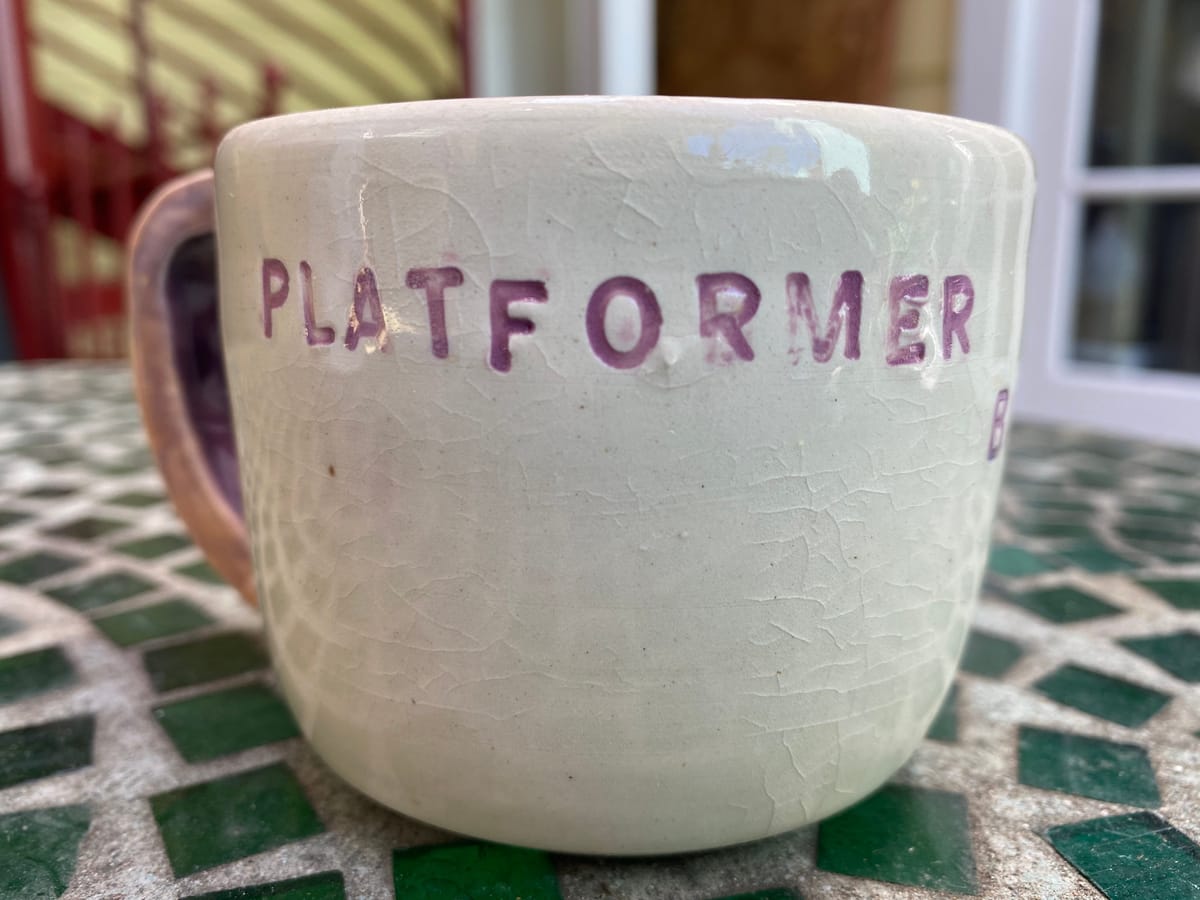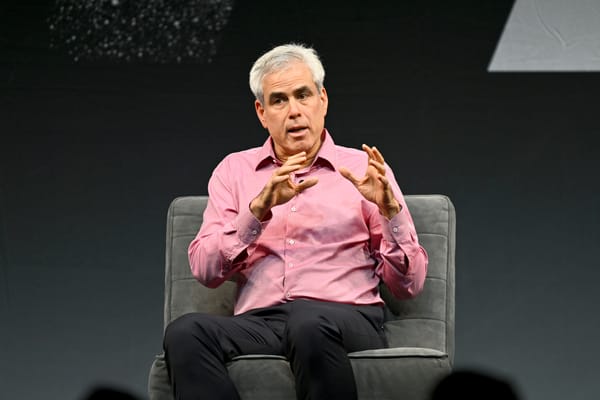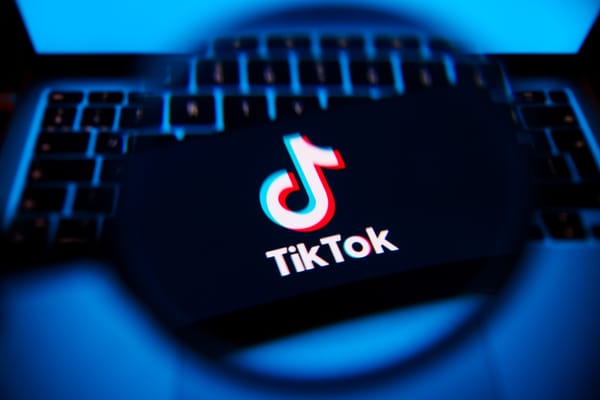Announcing Sidechannel, a new community for Platformer subscribers
On building a virtual newsroom with some of my favorite reporters


On Sunday night, Ben Smith at the New York Times got the scoop on a project I’ve been working on with some fellow independent reporters. Today I want to tell you about that project, called Sidechannel, and reflect on some of the opportunities here for journalists and audiences alike. (And if that all sounds a little self-indulgent to you, my apologies; I’ll be back at you with another free-to-everyone column later in the week.)
Sidechannel is a Discord server that I’m running along with seven of my favorite people in media. (More on them in a bit.) If you are a paid customer of Platformer, or any of the publications in the channel, next week you’ll get an invitation to join. Once you arrive, you’ll find a range of channels organized by publication, along with some shared ones that may be of interest to all. (There is a lounge for chatting, for example, and a room to post jobs of interest.)
To start with, there will be two channels for Platformer: one to discuss all the news links I include for you here each day, and another to post those good tweets. In the former channel, you can submit links for me to consider, comment on the stories of the day, and get to know your fellow readers a little bit better. Or you can visit all the other channels, and see what else people are saying in various realms of tech, media, and culture.
For my first six months writing Platformer — and three and a half years writing a newsletter — I haven’t done much to try to cultivate a community here. Honestly, I didn’t really know how. Most tech workers are loath to comment on current events under their real names, for fear of alienating their employers or otherwise harming their reputations.
That’s one reason why Sidechannel is pseudonymous. Create a Discord account using any name you like, and you’re free to discuss subjects without disclosing your identify publicly if you don’t wish to. My dream is that dozens of people working in policy, communications, and the C-suite pile into Sidechannel whenever there’s major platform news, and we pick it apart together in ways that make us all smarter. I don’t need to know who you are or where you work; as long as you’re following the rules, you’re welcome in Sidechannel. (And I won’t quote anything you post without asking first, which has long been my policy for email replies.)
But maybe you’d still rather lurk — that’s fine, too. And while I firmly believe a Platformer-only Discord would be a great perk for subscribers, I knew it would be even better if I could persuade some of my smartest friends in media to join me. And I’m thrilled to tell you that they did.
Here’s who else you’ll find in Sidechannel:
- Anne Helen Petersen (culture and remote work). A longtime BuzzFeed reporter who left last year to found Culture Study, Petersen is a wide-ranging writer who is also one of our sharpest observers about the fast-changing intersection between work and life.
- Eric Newcomer (startups and venture capital). A Bloomberg defector as of last year, Newcomer has been lighting up Silicon Valley lately with deeply reported, stylishly written updates about big money players in the tech industry.
- Kim Zetter (cybersecurity). A veteran of Wired and other fine publications who I have been reading as long as I’ve been reporting on tech, Zetter is one of the most respected reporters in her field.
- Nick Quah (podcasts and audio). I call him the Podfather; Quah started Hot Pod before paid newsletters were cool and his publication is the industry standard.
- Delia Cai (media). The media is self-obsessed, if you haven’t noticed from all the Substack coverage lately; Cai’s bloggy chronicles of an industry in perpetual transition have become must-reads for me and thousands of others.
- Ryan Broderick (internet culture). Broderick writes Garbage Day, a transcendent newsletter about the internet’s strangest corners, and he’ll be bringing the best of it to Sidechannel.
- Charlie Warzel (the attention economy). The newest arrival to the independent reporting life is also one of our most thoughtful interpreters of what the internet is doing to our politics and to ourselves.
In Sidechannel, you can find us sharing links, observations, zingers, and everything else that you could previously only see by hacking into a newsroom Slack.
The truth is that I miss my old newsroom Slack at The Verge. All day, gimlet-eyed reporters and editors would trade observations about big stories while also working very hard to make their colleagues laugh. It was everything you get from Twitter at its best, but with the enormous added benefit of a shared context and a sense of belonging. I want to see if we can build something similar together that feels like it’s more than the sum of its parts.
As we get our legs underneath us, we plan to use Sidechannel as a home base for all sorts of collaborations. We’ll host audio chats using Discord’s new Clubhouse-like features; we’ll spin up little podcasts; we’ll invite authors in to host temporary channels about their new books; and we’ll bring in other independent reporters to contribute their expertise and grow their own communities. I’ll flag notable events and discussions for you each day in the newsletter.
Like so much in this transitional moment, Sidechannel is an experiment, and sometimes experiments fail. I’ve spent enough time covering the content moderation efforts of other people to know that communities have a way of spiraling out of control, and I’m sure we’ll have our challenges if the community grows as we intend. And if it doesn’t grow as we intend, we may wind it down.
But three-plus years of getting wonderful replies from you all over email and Twitter has convinced me that … a lot of you should meet! Hang out! Exchange ideas! And get more value from your Platformer subscription than four emails a week and the satisfaction that you are funding truly independent journalism.
So let’s give it a shot.
Sidechannel launches a week from today: April 19. If you’re already a paid member, you’ll receive an invitation link in your email Monday. (Any questions or concerns? Send them my way and I’ll do my best to address them before then.)
And if you’ve been waiting for a good reason to subscribe, consider doing so now.
Pushback
One of my working theories about platforms is that if you want a company to change any of its policies, put them in a comparative chart with their peers. Researchers at Stanford have been doing a lot of this lately, and both when I wrote about their analysis of the election last month and when I covered a new report on policies related to self-harm last week, I heard back from the platforms found to be wanting very quickly.
In last week’s case, I noted that researchers said they could not find any policies related to posting content about self-harm on Reddit. Reddit followed up to tell me that they do in fact have such policies:
The Stanford research study did not accurately report on our policies and procedures regarding self-harm. We're following up with them on that, but I just wanted to share some of our resources with you and that were not appropriately taken into consideration or included in the report -- notably, we enforce against content encouraging or glorifying suicide (including suicide letters), eating disorders, and other forms of self-harm under our overarching rule against encouraging violence or physical harm. A few examples of previously banned communities show how we regularly enforce this rule against pro-eating disorder content, suicide content, and anything similar.
We also have a dedicated Reddit Help Article for users, "self-harm or suicide" has its own reporting category, and we've been in partnership with Crisis Text Line for over a year to provide real-time support to redditors who may be experiencing suicidal thoughts or other self-harm struggles.
So that’s that. Now if you’ll excuse me, I have some other comparative charts I’d like to recommend to the Stanford researchers. (“A comprehensive analysis of which social networks let you edit posts after they go up found that Twitter …”)
The Ratio
Today in news that could affect public perception of the big tech companies.
⬆️ Trending up: Facebook is using part of its headquarters as a public vaccination site. Might we see some executives getting the jab there for a nice photo opp? (Jessica Bursztynsky / CNBC)
⬇️ Trending down: Google’s secret “Project Bernanke” used past bid data to boost its win rate in advertising auctions, according to a court filing that was accidentally left unredacted. The program generated hundreds of millions of dollars in revenue for Google and was not disclosed to other publishers who used the platform. (Jeff Horwitz and Keach Hagey / Wall Street Journal)
⬇️ Trending down: Google’s ad platform makes it easier to target people interested in white supremacy than in Black Lives Matter, a new investigation found. “Google Ads also blocks the term ‘Black power,’ a phrase associated with the African American civil rights movement, but offered more than 100 million YouTube videos and channels it said were related to the White supremacist phrase ‘White power.’ 100 million videos! (Leon Yin and Aaron Sankin / The Markup)
Governing
⭐ Anti-union forces won in Amazon’s Alabama fulfillment center, delivering a stinging blow to the US labor movement. Here’s Josh Eidelson at Bloomberg:
Amazon may well spend years battling the union over the legality of the tactics it used to win in Bessemer, but whatever happens there, the election outcome will be cited as vindication for the company’s employment policies for a long time to come. In a statement, the union accused Amazon of “corrupting” the election through tactics such as pressuring the U.S. Postal Service to install a mailbox on the company’s property and pushing workers to cast their mail-in ballots there. “Our system is broken, Amazon took full advantage of that, and we will be calling on the labor board to hold Amazon accountable for its illegal and egregious behavior,” Appelbaum said. An Amazon spokesperson said the mailbox was a “simple, secure, and completely optional” way to make voting easier.
The organizing effort may have suffered from some of RWDSU’s strategic choices, such as agreeing to Amazon’s push that they accept votes during the seven-week election from hundreds of additional employees, including temps. But the bigger challenges were the structural disadvantages that face workers trying to organize at any major nonunion company in the U.S.
Related: Amazon takes a victory lap. (Amazon)
Apple executives said that putting iMessage on Android would “hurt us more than help us,” according to new court filings. Epic Games argues the revelations demonstrate that Apple is acting in anti-competitive ways to lock consumers into its ecosystem. (Jon Porter / The Verge)
The growing scandal around insurrectionist Rep. Matt Gaetz now includes allegations that payments he made to a sex trafficker were easily viewed on the public-by-default Venmo feed. Periodic reminder that Venmo transactions are public by default! We know what that mushroom emoji means! (Jose Pagliery and Roger Sollenberger / Daily Beast)
TikTok removed a Republican gubernatorial candidate in Minnesota from the platform after he repeatedly spread misinformation about COVID-19. Scott Jensen, a former state senator who had more than 280,000 followers, had previously promoted the idea that COVID-related death counts are inflated. (Torey Van Oot / Axios)
Facebook removed 16,000 groups dedicated to buying and selling fake reviews after the UK’s Competition and Markets Authority intervened. The CMA began pressuring platforms to address the issue in 2019. (Reuters)
A look at the factors that the Oversight Board will likely consider as it weighs whether to restore Donald Trump to the platform. Despite the board’s bias toward free speech, experts suggest Trump would only be restored under a narrow, legalistic interpretation of Facebook’s rules. (Cristiano Lima / Politico)
The surprising usefulness of Twitter bots in helping people find vaccination sites challenges conventional wisdom that automated accounts are used primarily for trolling and misinformation. Bots offering high-quality information and art are often part of a healthy social feed, this piece argues. (Kurt Wagner / Bloomberg)
An Australian judge stayed Epic’s lawsuit against Apple for three months while a similar case proceeds in California. Epic wants to be able to accept payments directly within apps like Fortnite while bypassing the App Store and Apple’s 30 percent tax. (Lauren Rouse / Gizmodo)
Chinese platforms Kuaishou and Douyin have focal points where enthusiastic nationalists and state media collaborate to harass dissenters in China and abroad. By appealing to misogyny or chauvinism, state media is often able to get average citizens to dox or otherwise harass dissenters on the ruling party’s behalf. (Zeyi Yang / Protocol)
Industry
⭐ Microsoft bought Nuance, makers of powerful dictation software, for $19.7 billion. The release positions the deal as having a lot to do with healthcare. Here’s James Vincent at The Verge:
Nuance is best known for its Dragon software, which uses deep learning to transcribe speech and improves its accuracy over time by adapting to a user’s voice. Nuance has licensed this tech for many services and applications, including, most famously, Apple’s digital assistant Siri. (Though to what degree Siri currently relies on Dragon to answer users’ queries is unclear.) Dragon is an industry leader in terms of transcription accuracy.
The $19.7 billion acquisition of Nuance is Microsoft’s second-largest behind its purchase of LinkedIn in 2016 for $26 billion. It comes at a time when speech tech is improving rapidly, thanks to the deep learning boom in AI, and there are simultaneously more opportunities for its use.
Related: Antitrust pressure on other companies seems to have created a lane to make lots of giant acquisitions; the company is spending more than any of its peers. (Alex Sherman / CNBC)
More than 500 Alphabet employees signed an open letter demanding that the company stop protecting harassers at the company. The letter came two days after a former Google engineer published an op-ed alleging that she was forced to work with the man who harassed her even after filing a complaint. (Zoe Schiffer / The Verge)
Related: the story of a Google contractor whose suspension was overturned after it was revealed that the company had illegally ordered workers not to discuss their pay. (James Clayton / BBC)
“Facebook disproportionately shows certain types of job ads to men and women, researchers have found, calling into question the company’s progress in rooting out bias in its algorithms.” New research from USC showed men were more likely to be shown pizza delivery jobs; women saw more jobs to shop for groceries at Instacart.(Jeff Horwitz / Wall Street Journal)
Facebook’s bad reputation among politicians and the press has obscured the degree to which Apple’s app tracking transparency feature will harm the ability of small businesses to reach new customers, merchants say. Small businesses will now have to spend more money to achieve similar results through ads, since they will have ot pay to show them to larger audiences. (Christopher Mims / Wall Street Journal)
Intel is developing Bleep, “a user-facing application that uses AI to detect and redact audio based on user preferences.” This piece comes out strongly against it, and networks still need system-level moderation. But I generally think that giving users sliders to manage the kinds of content they want to see and hear is a good thing. (Luke Plunkett / Kotaku)
Twitch hit an all-time viewership record in March with more than 2 billion hours watched, “buoyed by hot content like watching people sleep and a roleplaying mod for an eight-year-old sandbox game.” Facebook Gaming, meanwhile, is at 400 million hours watched. (Thomas Wilde / GeekWire)
Reddit is the latest social site getting to work on a Clubhouse clone. The speed with which these are coming would suggest Clubhouse really won’t have much of a competitive moat even after the Android launch, at least to me. (Jack Morse / Mashable)
People now spend an average of 4.2 hours a day in apps, up 30 percent from 2019. Congratulations once again to screen time for winning the debate over screen time. (Sarah Perez / TechCrunch)
Gizmodo is archiving Yahoo Answers, so you’ll always know how babby is formed. Heroes. (Dhruv Mehrotra and Shoshana Wodinsky / Gizmodo)
Those good tweets
RIP prince phillip. i literally didnt know you existed until i got on twitter last year
— anne (@codinghater) 5:07 PM ∙ Apr 9, 2021
I got the Pfizer vaccine and pso pfar pno pside effects.
— Jessie (@mommajessiec) 1:34 PM ∙ Apr 8, 2021
All Godzillas are beautiful.
— Queen Ghidorah (@RhysChryspies) 10:01 PM ∙ Apr 8, 2021
How do you do, fellow trees?
— Goats? (@Gooooats) 11:46 PM ∙ Apr 8, 2021
Talk to me
Send me tips, comments, questions, and your wishlist for Sidechannel: casey@platformer.news.





